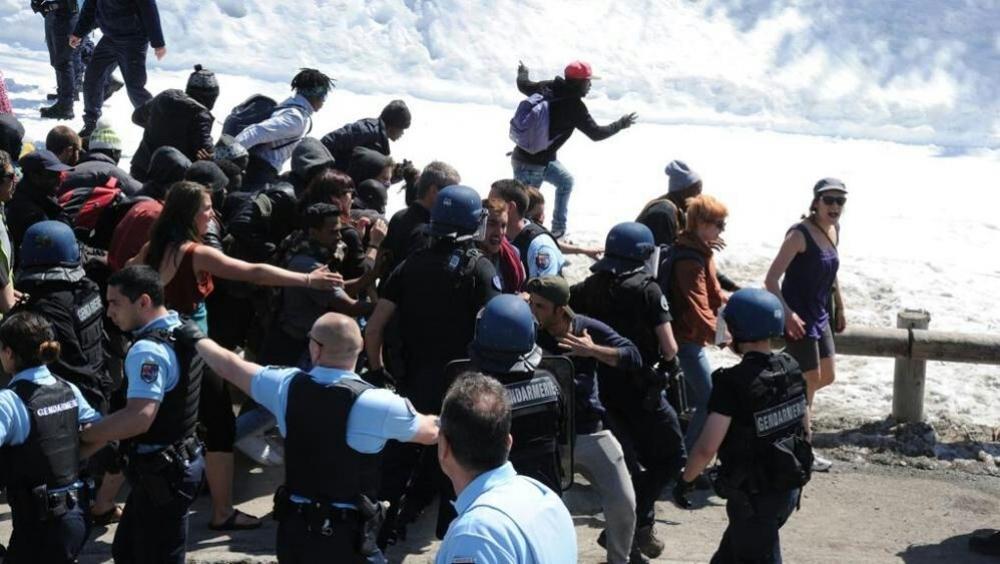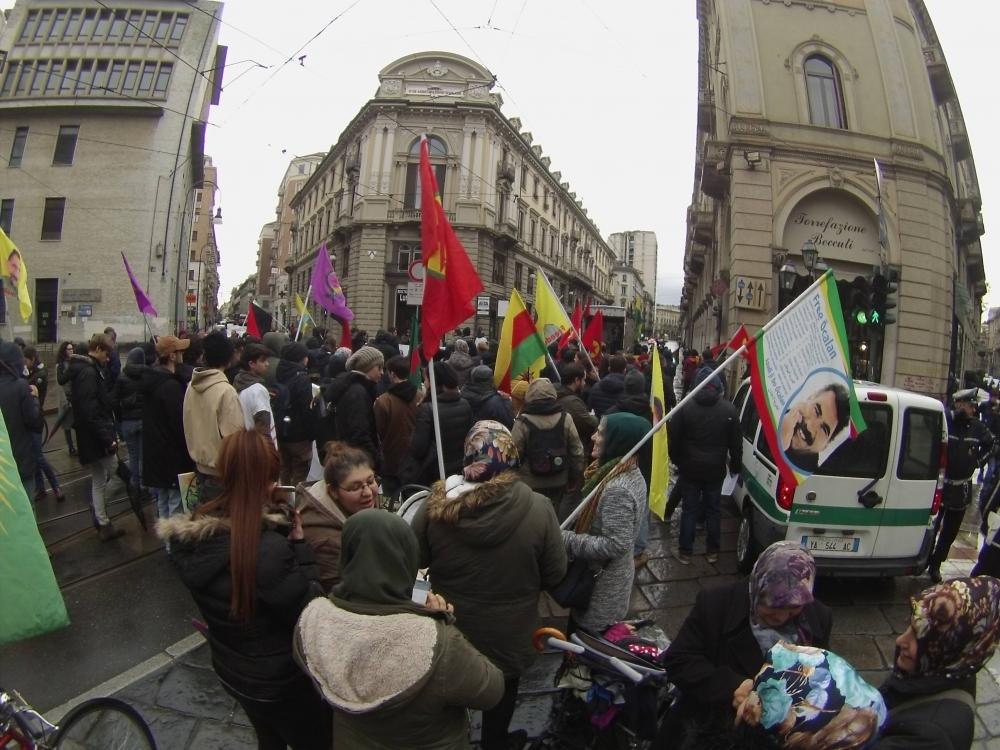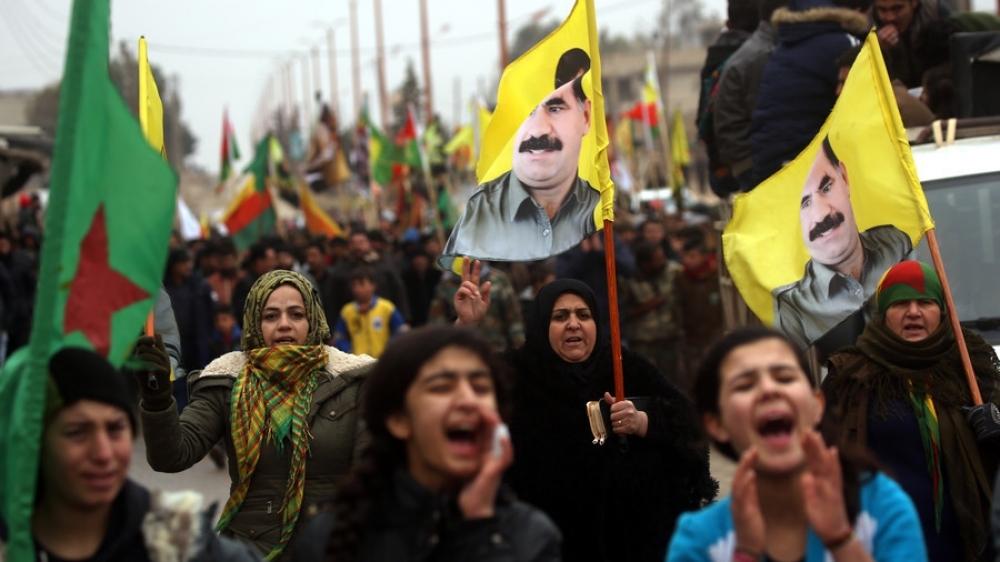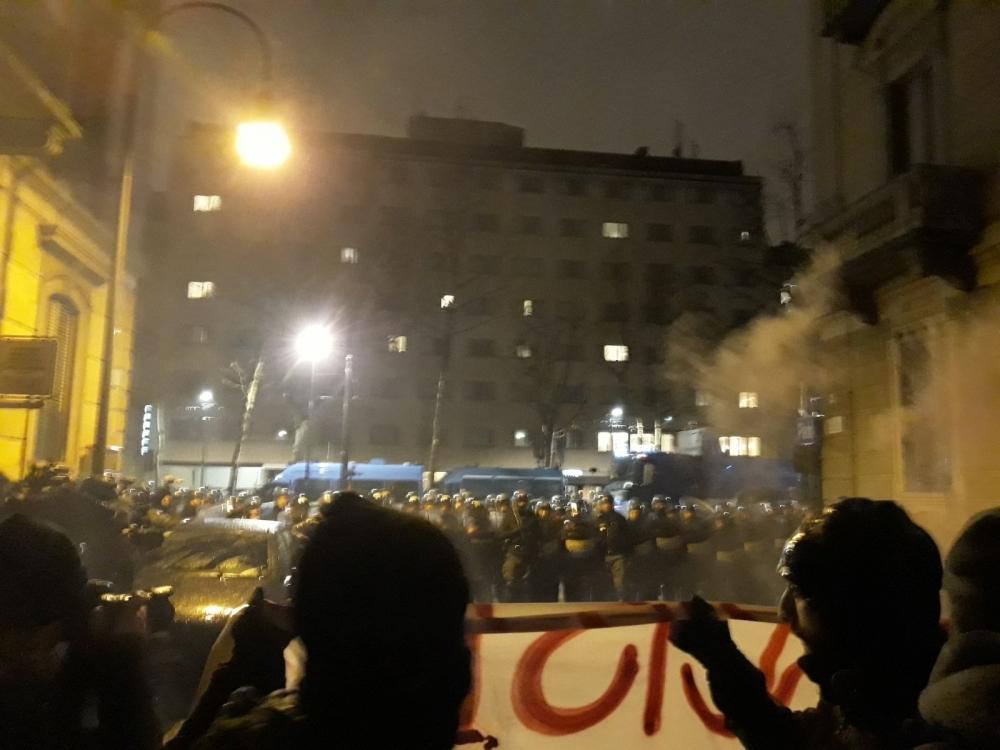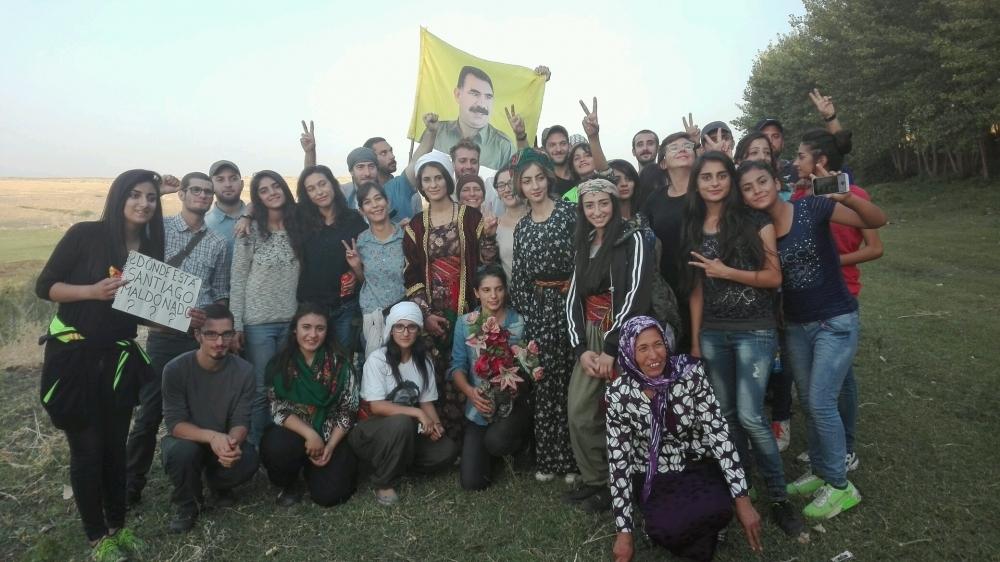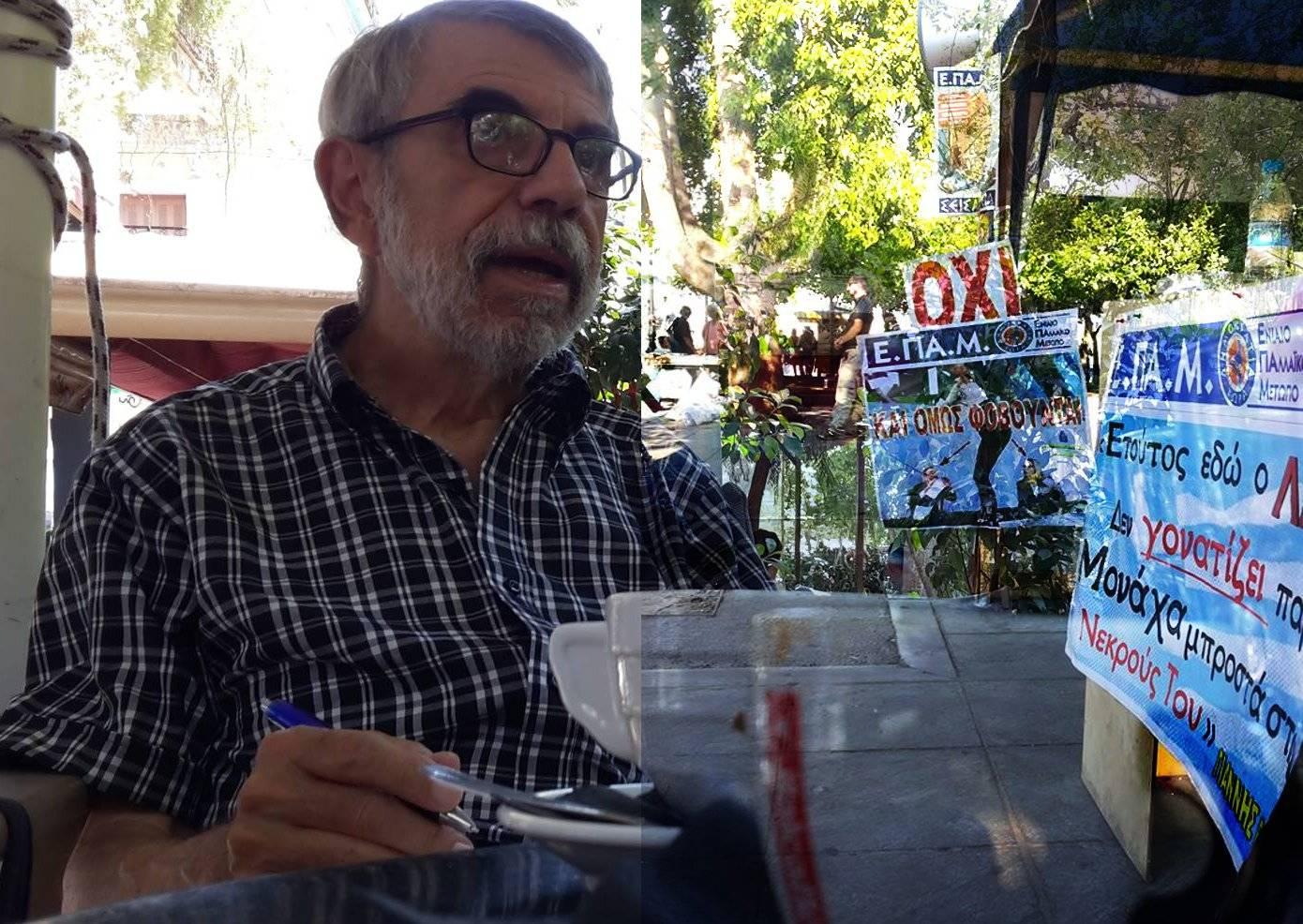
Greek crisis, a new stage of the plans of structural adjustment – Interview with George Caffentzis
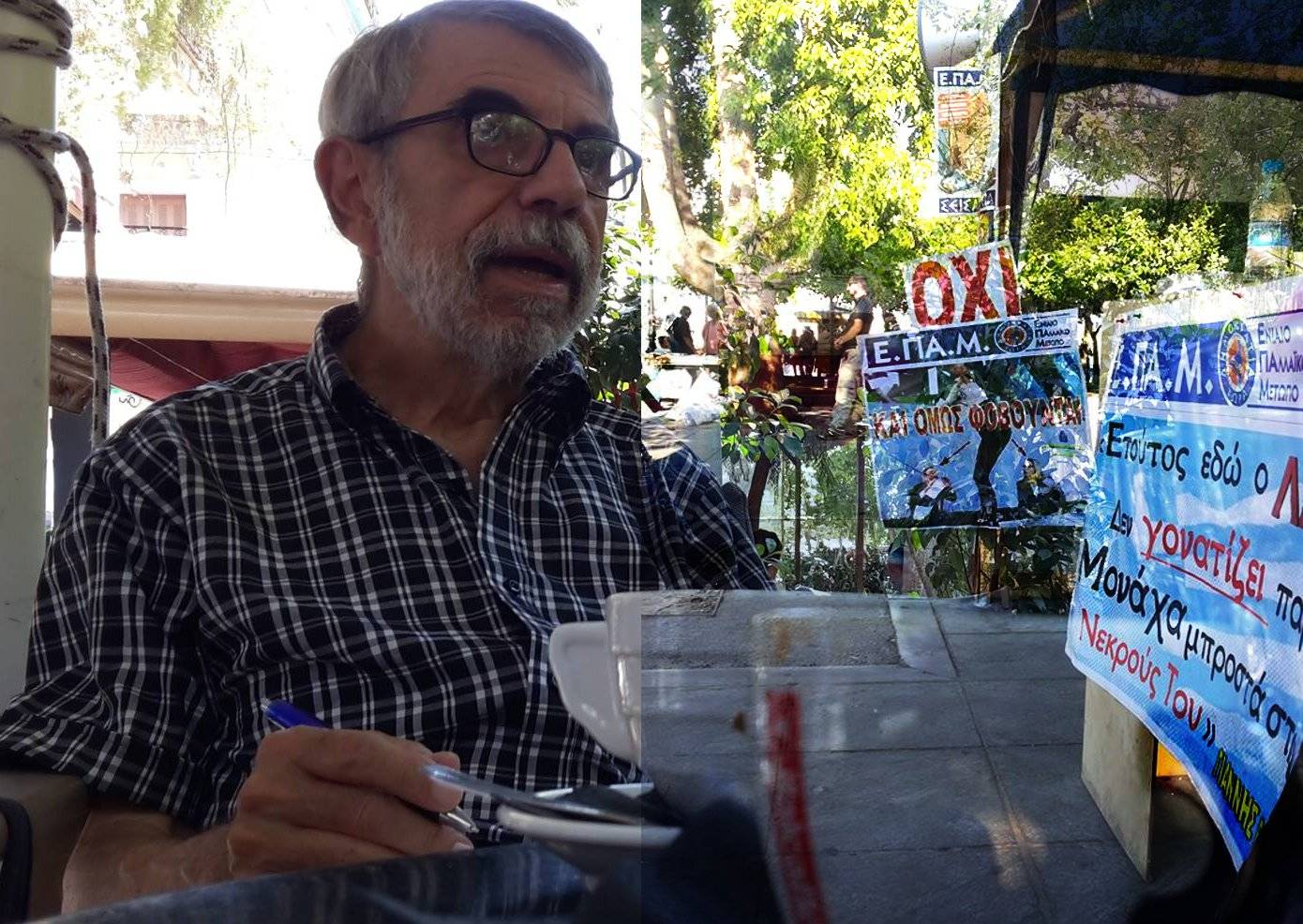
You are American, but of Greek origin. Every year you spend some time in this land. What are the differences in the conditions of life that you have noted in the course of your stays in Greece, and how have these worsened with the passing of the years?
I’ve been coming to Greece since i was a 4 year old boy. I recall my first memories from a little after the end of WW2, in 1949 and also from the start of the 50’s. It seemed like Vietnam of 1975, conditions of extreme poverty, just as right after the war. I remember a trip from Sparta (where my parents came from) to Athens, with my family. For me, a young boy, it was a scene from a western, cowboys and indians, this was the Greece of the 40’s and 50’s. That which i came to know during my adolescence was instead a country subjugated by United States control, inherited from the English. Greece had become an outpost of the Atlantic Aliance of the cold war against the Soviet Union. There was a feroceous repression of the left.
I remember also the Greece of 1981, it was like a fracture: the beggining of the era of Pasok, of Papandreu, the entry into the European Union. The country changed suddenly. There began to be consistent capitalist investment, above all in infrastructure (ports, highways), in energy, the islands opened to tourism. Great masses of people moved to the city, Athens became a giant metropolis. Greece began to seem more European. The country I found when I came here as a boy had a profoundly rural character, the conditions of life were frugal, there was a strong attachment to the land, even in those who lived in Athens or Thessaloniki. Suddenly people began to live like in Paris or London. A different kind of personality began to take form. Now we arrive in the decade of 2000 and that which you have under your eyes is another Greece. It’s something taken as a given by everyone. And it’s for this that the last 5 years have been so hard, because they called into question standards of living that everyone thought had been established once and for all.
This investement in transforming forms of living corresponds to a profound rise in the financialisation of the greek society and economy…
It’s a part of history, you’ve got high standards of living, an economy that becomes urbane (5 million people in Athens, 1 and a half million in Thessaloniki, we’re talking about a society that is completely urbanised). When one speaks of consumption, of financialisation, it’s an imposed form of life that we’re speaking about, not of something that is chosen. When you live in an apartment in the city, it’s not like ijn a village community any more, the things you need you have to buy, whether you like it or not. It is a profound change that occured in Greek society. Something which I was able to observe directly, through my relatives who live here. The assumption was however that this was a one-way trip, and because of this the last five years were a shock to so many: guarantees that were thought to be certain have been dismantled, nothing of that which was given as certain remains so. The recent vote for OXI is the espression of the acknowledgement that things have changed. For many people i know it was a labour of redefinition, a saying to one’s self “Wow! It’s this that they want from us…”.
There seem to me to be two interesting aspects here to consider and develop. The first is that the people interpreted the transformation of society as a “given” and an improvement of the standards of living (access to consumption, wealth). At the same time the promises of neoliberalism presented the bill to the Greek people, saying: “you’ve lived beyond your means, now you must pay”. In the resistance expressed by the No vote and by these years of struggle, there is also the non-acceptance of losing these standards of living that were reached…
Well, yes, this is how it is, but it’s not only the Greek proletariat that is in crisis, it’s also Greek capital, let’s not forget it.
This is the real point of departure, that which jammed the process of accumulation of European capital, which is facing a crisis of profit, of accumulation, that is now long term. It’s a crisis that the Capital is trying to resolve through means that are definitely not Keynesian! But they won’t return either to the formulae of the 19th century. That which they are using is the classic liberal approach: cut wages and every kind of guarantee and right; dumping that is the costs of reproduction of the working class on itself, on the proletariat. Because there are only two ways to exit from a crisis of this type, both vital, because both acknowledge that things can’t go on like this. Two ways that correspond to two “parties”: the Greek proletariat and European capital. The difficulty in finding that which is presented as a financial solution demonstrates in fact that the “Greek problem” is not one of financial order. It’s evident what’s normally done in these cases: a haircut, elimination or large reduction of debt to restart the mechanism and set off again. There is nothing new here, what’s new is the dramatic situation in which European capitalism flows. The question therefore is entirely political. If you pay attention, between the reforms they ask for, there is always a new piece of legislation regarding work and pensions. Why? Because that which they want to do is that which I saw applied in Nigeria: a radical remodelling of society to create conditions for a new [original] accumulation of capital. The processes which we are assisting playout on two levels: one, the official one, is the face of capitalism in its financial dimension; the other, underlying and unacknowledged, is the devaluation of labour power and its reproduction.
The latter is an important aspect, a central one, not only for the Greeks. Here they realised: “it is this that we must face”.
For this there is no particular anxiety about what kind of memorandum will eventually be signed. They interpreted the situation as a pronouncement regarding the acceptance or not of the conditions that are imposed on them; and as a question as to whether it is instead the case of starting something else. What this something else could be is rather varied: for some it is a Keynesian solution (Varoufakis, Syriza). Theoretically this would be possible but political it would be an enormous problem because it represent a path that has already been followed and, ‘capitalistically’, doesn’t work. In that case Europe would become for capital a kind of kindergarten, not a space in which to realise true accumulation. If they are not able to solve this problem connected to accumulation in Greece, to then generalise its solution to Italy, to Spain, to the same German workers, they are ruined. We are observing a new stage of the structural adjustments and the crisis of debt of the early 90’s. As a Newyorker, I already observed it in the 70’s, with the fiscal crisis, then again in Nigeria in the 80’s. We saw it in its slower and deformed United States version, now we see its arrival in Greece. It was a long process, that is at least 40 years old. That which is new, is that it has reached the European context, from where it was supposed to stay away, instead it has happened here as well. For this Sunday’s answer was important, because it opened up new possibilities.
Not to poke fun but Greece is the only country in the world that celebrates a day dedicated to no, to Oxi. When Mussolini was preparing to invade Greece, he sent a telegram to Metaxas (also a fascist dictator) intimating that the latter should give himself up, but he said no, and from then on that day was made a holiday. The people aren’t afraid to say no.
The second aspect is the one posed here, today, in light of the changes taken on by the Greek population (and by extension, tomorrow, the European one) to their lives over the last ten years – the end of a relationship with the land, therefore of a possibility of survival decoupled from the capitalist relation. It’s a big question! A comrade from Athens said to us yesterday: “our problem is today what to do concretely. If we went ahead and assaulted the supermarkets, what would we do after two days when they are empty?!” How can we today face the level of social reproduction? Do there seem to you to be glimpses of embryonic ‘commoning’ within Greek society?
Well, this is an enormous problem. Actually it’s The Problem. There is a principle of returning to the countryside, an attempt to recreate for example subsistence farming, an agricultural economy of subsistence – farmers who come into the cities to sell their goods directly without meditators or networks to distribute food for free – but one is dealing with small scale initiatives, certainly not able to satisfy the needs of today. A little bit like the self-managed clinics, I had news regarding four of these: in Thessaloniki, in Athens near Exarchia square, in Eraklion and Rethymno on the island of Crete. They are making enormous efforts, in particular for those who don’t have regular access to medical treatment. Others are opening around the country, based above all on volunteer labour. The begin to reconsider the asymmetric relation, of power, between doctor and patient. They make great efforts to try and weave a network capable of functioning after a possible collapse of the state; to think of a new type of medicine, based on community. The problem is how to expand these experiences to a larger scale. We’re talking about a service that, they tell me, was able to satisfy 1000 to 1500 patients a year, but should have a capacity for action for millions of people.
These levels, those of agriculture, of housing, of the reorganisation of spaces, urban and of the small villages, are today a great challenge. There is a fact that begins to be recognised, that the Keynesian solution is not only problematic for capital but also for us. One thing is what Syriza does, increasing the number of people who have the right to access health insurance, another thing is rethinking what is treatment and health. An absolutely necessary question because it’s this very hospital system that is in crisis. Think about the discussion surrounding iatrogenic illnesses, caused that is by medical intervention, the fear of being contained in the hospital because this very medical institution is today a cause of illness. It’s a global question, not a Greek one. We all face it. Also with respect to food, there are questions to ask ourselves: that which I am eating nurishes me or kills me? The underlying assumption is that the state doesn’t provide for our survival any more.
As you suggested in part in your statement, there is also though also a problem of scale, of the ugly power balances that today exist between the Greek proletariat and the European union: for example liquidity controls, the use of debt as a noose around the neck of the Greek people. That which manifests itself is a pure problem of power…
We are here dealing with the famous question of scale. We can take as an example the zapatistas in Mexico, who control a territory of hundreds and hundreds of kilometres, with dozens of municipalities which have created their own form of administration, making collective decisions. Their experience shows that these things are possible. However they base themselves on social development [endogenous] forms that are thousands of years old, that we don’t have in the big cities. I would look further at the case of Argentina, where I was a couple of months ago, and at the large number of favelas in which the people have arrived at remodelling their urban lives, at the growing control they were able to create over their day to day lives, a different relationship to property. It’s a very long story…
Here in Greece the experience is younger. The return of a life in the countryside regards a few tens of thousands of people, but the majority emigrates: Germany, Australia, towards places where they hope to elude the capitalist crisis. There are efforts but the forces, specifically those monetary ones, that are imposed on Greece are very strong. And sincerely I don’t see in Syriza, in its approaches, an answer to these social problems. It sees still too much the state as an agent capable of giving answers, rather than proposing alternatives. If we look instead at the example I made before, of Argentina, the communities of the favelas were able to construct a social power that obtains from the state resources, without giving it in exchange control of them. They constructed asymmetric relationships of force. They are more powerful.
What do you say to us about the result of the referendum: how can we read it from the point of view of the class struggle (and of the class mood)? Many comrades maintain that the referendum was an internal clash, between sectors of the bourgeoisie, but this seems to me to be a reductionist reading of that which is happening…
I agree with you. Certainly, there are always internal disagreements within the capitalist class about how to resolve a crisis: some regard the internal question, others the European union as again the saviour… But we have to think about how millions of people voted, and they have their reasons. I’ll just give you one example: many people whom I know expressed in their vote the refusal of being terrorised. The fears were projected onto the social stage: you won’t have any more medicines, you won’t have schools. Many in my family voted Oxi just to say “you won’t intimidate us anymore! You won’t make us accept that this is the only way.” After years, an explicit refutation of austerity, because the people touches with their hands the fundamental question of social reproduction. We’re not at the start of the crisis, it’s five years that the people are living with it on their shoulders. The people said: “we’ve had enough: Ya Basta!” I’d say that this is the principal meaning of the vote.
For that which regards the class composition of No and of the political currents that oriented it, I think that Syriza has fundamentally a programme – clearly expressed in the statement of Varoufakis – in the style of Krugman and Stigliz: they propose a revival of neo keynesianism. It has its logic, it’s understandable, but here in Greece there is also the whole movement of the solidarity economy, which has a different programme, not reducible to that of Syriza; it’s born from the experience of the anarchists, autonomists, extra-parliamentary movements, from the grassroots initiatives.
There is also the strong tradition of the Greek Communist Party (KKE), there are various strategies in play. I’m not sure what will emerge. I am on the other hand certain that Syriza won’t be able to convince the European ruling class that Greece is out of control and that it is therefore necessary for them to make a pact, a New Deal according to the American model of the 30’s.
Can we read the No as an initial breaking away from the mechanism of debt? What effect could it have on class composition? How to maintain that no?
There is a financial solution, which is also political, and speaks of grexit: abandon the euro zone, institute other monetary relations of exchange and value; it’s a proposal supported by many and diverse categories, a concrete proposal, possible, perfectly logical. In Argentina they did it, they abandoned the economy based on the dollar. From a capitalist point of view it makes sense, but I’m not interested in that point of view, I’m not interested in reasoning about how to exit from the crisis in the capitalism. That is their solution, of a part of Capital (including many members of Syriza). The task, for us, is to think of a non capitalist exit from the multiple crises we find ourselves in. There are projects, visions that implicate alternative economic and social solutions that seems to me to be perfectly realisable. I don’t believe that Syriza is the solution: it’s a coalition of neokeynesians. I think rather about solutions focused on the concept of commons.
What was the role of the International Monetary Fund in this crisis? In the European newspapers the narrative surrounding the IMF is that of a neutral and impartial subject, a disinterested one. We know instead of the grand convergence of interests here, a kind of super-agent of capitalism, and the United States, through the Washington consensus…
The IMF carries out more or less that for which it was created, that which I was already able to observe in Nigeria in the 80’s: its objective is to apply the Plans for Structural Adjustment. Hence its dissatisfaction for the work of Syriza, which didn’t accept in the end such indication. After the European Union realised that the IMF didn’t look only to Europe, that its worries didn’t centre solely on the failure of accumulation of European capital, but that it had instead an international concentration, from the point of view of the collective global capitalist, the EU had to therefore take into account that which that United States thought about relations between Europe and the rest of the planet. As far as I was able to understand, the indications of the US for Europe were to be cautious about the Greek situation: “be careful about what could happen, there is another card in the game and it’s better that it isn’t played.” The US didn’t want Greece out of the EU because there was also the strategic passage of the TTIP internally through Europe, that would need to be ratified by national parliaments. An event that will have important consequences for the US and a direct impact on the European proletariat. Their dictates went a bit like this “it’s not the right moment to push too hard, better instead to lay the groundwork for the next leap”. We’re dealing with therefore having a European Commission oriented more towards the whole of Europe, above all with a view to approving the treaty.
To finish, I would like to saying something further about what we ourselves should do, outside Greece, in the United States of the rest of Europe. We must support the anti capitalist dimension expressed in Oxi. What can we, ourselves, do in the coming months, to support the Greek proletariat? Italy is part of this story.
Ti è piaciuto questo articolo? Infoaut è un network indipendente che si basa sul lavoro volontario e militante di molte persone. Puoi darci una mano diffondendo i nostri articoli, approfondimenti e reportage ad un pubblico il più vasto possibile e supportarci iscrivendoti al nostro canale telegram, o seguendo le nostre pagine social di facebook, instagram e youtube.












